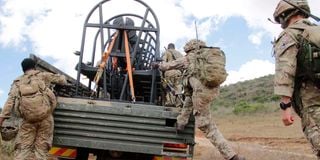Protect locals in foreign army ventures

British Army soldiers board a military truck after a battle group exercise during a media engagement at the Lolldaiga training area in Laikipia County on November 14, 2022.
A China-Tanzanian joint military exercise that commenced on July 29 at the Comprehensive Training Centre (CTC), in the Bagamoyo district of Mapinga, Tanzania, ends on August 11. During the two weeks of “Operation Peace Unity 2024”, the troops involved will engage in land and sea drills aimed at building their capacity in joint counter-terrorism manoeuvres.
Notably, the exercise features a large number of Chinese troops, heavy military equipment and large warships and destroyers. And this does not just reflect the continental power projection capabilities of the Chinese People's Liberation Army (PLA) to ensure peace and stability around the world; it could also be a pointer towards a covert plan by Beijing to set up a military base in Tanzania.
Historically, hosting foreign military bases has proven to have a vast array of disadvantages to the host country. Hence, the citizenry should start asking some tough questions with regards to such arrangements. African populations, political leaders and institutions are often wary of foreign bases for several reasons. They include the perception that the foreign military could undermine the host government’s domestic agenda or sovereignty.
Foreign bases
The mood across Africa about establishing more foreign bases is becoming increasingly ambivalent. For instance, West African countries Niger and Burkina Faso last year expelled US and French troops, citing interference with their governance and exploitation of their natural resources.
A 2016 AU Peace and Security Council decision that warned African countries to be cautious about hosting foreign bases has since hardened their stance, given the turbulent geopolitical winds in parts of the continent. Foreign countries, cognisant of the fact that the reception from the local administration would be hostile at best, are now likely to interfere with the electoral and policy formulation processes in a bid to secure own interest.
But how is the partnership going to be beneficial to the people of Tanzania? Instructively, there are an array of complaints economic—including debt-trapping, dependence and prioritisation of Chinese interests over local needs. Besides, accusations of increased corruption in Africa, as well as bribery and unfair business practices, have been put forward.
Commenting on the Chinese base in Djibouti, for instance, Thierry Pairault, of the French National Centre for Scientific Research, said: “Chinese money has had very limited impact for Djibouti.” He added that the investment has been mainly outward-looking.
Additionally, there are several generic environmental impacts associated with the construction of almost all complex infrastructure projects that house military bases. They include habitat degradation, soil erosion through excavation and chemical contamination.
British military
It will be recalled how in 2021, more than 7,000 acres of land, mostly pasture, in Lolldaiga, on the foothills of Mount Kenya, was destroyed by a forest fire triggered by the carelessness of British military training units in the area. The inferno lasted days, causing unimaginable damage to property and animal habitat.
British military training in Kenya has had devastating effects on the environment through the units' live firing exercises, which emit dangerous gases to the ecosystem, as well as abandoned unexploded ordinance (UXO) that explode later when triggered by livestock and herders.
The socio-cultural impacts of having a foreign base within a developing country cannot be ignored. A small town like Nanyuki, for instance, has a very high rate of prostitution, the pull factor being the existence of the British base within its precincts.
But what are the dispute resolution mechanisms and measures available to cushion the people of Tanzania from the disputes that are likely to emanate from this partnership?
Most African leaders resort to opaque negotiation processes with such foreign entities, hence blind-siding the citizenry. However, ensuring an open negotiation process devoid of underhand bargains, encouraging public participation and having the interests of the nation first would ensure that the nations do not enter into partnerships that end up hurting the nation.
The British military units training in Kenya have been accused of a barrage of atrocities against the environment as well as against Kenyans. To ease the compensation process and maintain the diplomatic collaboration, the British government, in 2016, signed the defence cooperation agreement (DCA) which allows aggrieved parties to directly sue BATUK.
So while international cooperation is something every country should strive to achieve, it should not come at a cost so steep to the hosts; it should not be a form of ‘soft’ colonisation; and the intent shouldn’t be to exploit the host country and its resources.
Ms Simiyu is a freelance geopolitical writer, communications consultant and human rights defender. [email protected]





